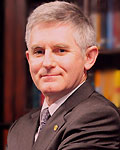 |

|
 |
Dr. Patrick O'Shea |
|
The University of Maryland’s new vice president for research, Dr. Patrick O’Shea – currently chair of the Department of Electrical and Computer Engineering and co-director of the Maryland Cybersecurity Center – is proposing an aggressive plan to build the institution’s research profile regionally, nationally and globally, including an emphasis on multidisciplinary, large-scale collaborations with industry and government, and closer relationships with the University of Maryland Medical School and other University System institutions.
O’Shea also promises greater rewards for faculty innovation and new initiatives to encourage entrepreneurship, commercialization and technology transfer. He will assume the new post July 1.
“This is a critical position for Maryland, with responsibility for more than a half-billion dollars in research funding,” says University President Wallace D. Loh, announcing the appointment. “Patrick brings that rare blend of academic expertise, vision, administrative excellence and entrepreneurial spirit to this pursuit. He is well-equipped to increase the University’s research and educational impact internationally and within this region.”
An alumnus of University College Cork, Ireland, and the University of Maryland, O’Shea has been active in interdisciplinary research and management for decades, both in government and academia. He has served as a project leader at Los Alamos National Laboratory, and director of the University of Maryland Institute for Research and Electronics and Applied Physics.
For the past six years, he has led the Department of Electrical and Computer Engineering, the largest department in the A. James Clark School of Engineering. He directs a new strategic relationship with Lockheed Martin, and the Maryland Cybersecurity Center, or MC-Squared, a cross-campus initiative launched last fall. Previously he played a leading role in launching the Maryland NanoCenter and the Center for Applied Electromagnetics.
As a researcher, he is recognized as an expert in applied electromagnetics, and is best known for his pioneering work on electron accelerator-based light sources and free electron lasers.
“We will be bold, diverse, adaptive, creative, innovative and entrepreneurial,” says O’Shea, who will replace interim research vice-president Norma Allewell. “Our aim is to take our place among the great institutions of the world, dedicated not only to the dissemination of knowledge, but to its creation and application.”
O’SHEA’S PRELIMINARY GOALS INCLUDE:
Promoting research impact
O’Shea has emphasized the need to establish a vibrant “ecosystem” at the University of Maryland for promoting diverse research, scholarship and creativity of the highest caliber. Under O’Shea, the Division of Research will also promote the creation of innovative, product-based companies.
“We will substantially increase our efforts in faculty entrepreneurship, technology transfer, and commercialization, as well as modernize the reward structure for faculty, thereby enhancing our state’s and nation’s competitiveness, and fuel our economic development engine,” O’Shea adds.
Catalyzing significant research initiatives
O’Shea believes the University of Maryland must leverage its special location “inside the beltway,” surrounded by major federal research installations, and further advance the University’s Research Park, M Square. O’Shea will also work to strengthen research relationships with the University of Maryland Medical School and other University System of Maryland institutions, and promote large-scale, high-impact, transdisciplinary research collaborations with industry and government on major, multi-investigator initiatives.
“Size matters when it comes to research impact, and this heightens the importance of collaboration with all sectors,” O’Shea notes. “Downsizing of long-term corporate research labs is increasing the importance of academic research. Strong university-industry ties are critical to the economic future of our country. The University will play an increasing role in strengthening the government-university-industry triangle in a way that is symbiotic to our mutual interests.”
Among O’Shea’s other priorities will be enhancing division’s business and compliance practices to facilitate more effective collaboration with the commercial sector and more fully integrating the University’s education and research missions.
O’Shea, who , was born in Cork, Ireland, where he received his secondary education at Coláiste Chríost Rí, and his B.Sc. degree in physics from University College Cork. He received his M.S. ('82) and Ph.D. ('86) in physics from the University of Maryland. In recognition of his leadership in science, engineering and education he has been honored as a Distinguished Scholar Teacher of the University of Maryland, Fellow of the American Physical Society, Fellow of the Institute of Electrical and Electronic Engineers, and Fellow of the American Association for the Advancement of Science.
O’Shea’s complete biography is available online: http://www.ece.umd.edu/~poshea/
May 27, 2011
|

